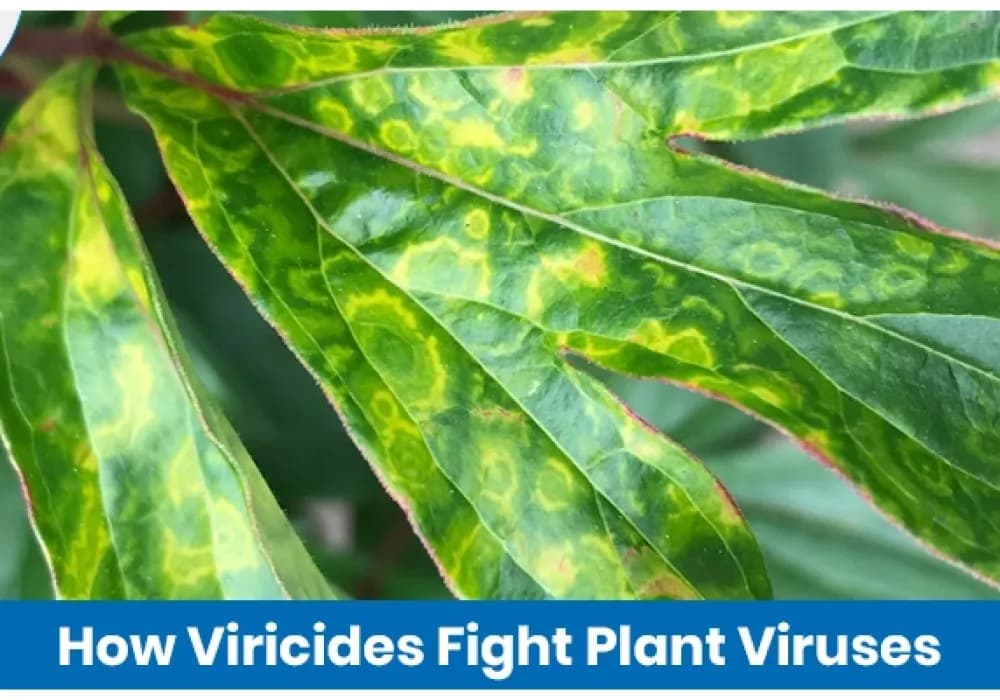Viral diseases and farmwide infections are considered one of the most damaging problems in modern-day agriculture. Viral pathogens are responsible for many cases of severe crop losses.
Before you can control the infection, it can rapidly spread through insect carriers, such as aphids, whiteflies, and thrips. To deal with such serious viral challenges, viricides are applied as a part of organic viral disease management.
Through this blog, we will explore the role of virus control solutions in organic farming, including their types, modes of action, and best practices to enhance your understanding. We will also touch up on organic viricides and plant antiviral agents as a part of organic crop protection.
What Are Viricides?
Viricides are chemical agents designed to inactivate, reduce, and suppress the propagation of plant-based viruses. In contrast to chemical pesticides, which kill insects or fungi, anti-viral treatments for plants have the ability to directly target viruses and stop their spread both inside and outside.
A wide range of natural virus control solutions for plants is available on the market. They include herbal viricides, bio-based formulations, and biological agents, which are safe for use as organic pesticide alternatives. They enable organic virus control in crops while maintaining the soil’s fertility and microbial balance.
Why Viricides Matter in Organic Farming
In conventional or normal farming practices, we can observe a significant amount of unsustainable chemical treatments. These synthetic products lead to residue problems, resistance development, and other environmental risks. But on the other hand, natural anti-viral treatments for plants provide residue-free, eco-friendly virus management for organic farms.
Additionally, achieving higher biodiversity alongside long-term soil health is also possible through these organic crop protection measures. Therefore, if you want an eco-friendly virus control while still ensuring stable yields, you can count on bio virus control solutions for agriculture.
Types of Viricides Used in Organic Farming
Herbal / Plant Extract Viricides
Herbal virus control solutions are formulations prepared from herbal sources, such as tulsi, garlic, or aloe vera. The antiviral compounds in these plants can disrupt the external coats of viruses and prevent their spread. Natural anti-viral treatments for plants, like neem oil sprays, work extremely well for vegetable and pulse crops. Such plant-based extracts are also safe for organic farming as they leave no toxic residues.
Biological Agents
Trichoderma, Bacillus subtilis, and Pseudomonas fluorescens are among the beneficial microbes used as bioviricides in agriculture. They improve soil health and trigger a systemic resistance in crops. Biological anti-viral treatments for plants also cure yellow leaf curl viruses in tomato cultivation and necrosis virus in groundnut crops, as a part of organic viral disease management.
Natural Chemicals and Derived Substances
Compounds that work as natural viricides for plants are used to boost plant immunity and increase viral resistance in plants. Chitosan, salicylic acid, and seaweed extracts are a few examples of natural viricides. They are also considered organic pesticide alternatives, as they don't cause soil erosion or water contamination. They provide an eco-friendly virus control in high-value crops, which is why they are popular and highly recommended.
How Viricides Work in Plants
Anti-viral treatments for plants show different ways of action depending on their composition and the type of virus they control. These substances target the life cycle of viruses without leaving harmful residues. Direct attacks on viruses and support to the plant’s natural immunity ensures healthier crops. And viricide usage also ensures that the quality of the crop is maintained along with higher yields.
Breaking the Virus’s Outer Covering
Some virus control solutions weaken the protein coat that surrounds the virus. After this protective layer is broken, a virus cannot attach itself to the plant’s cells. And as a result, infection cannot occur. Meanwhile, the plant is capable of easily resisting any further potential damage.
Stopping the Virus's Growth
Certain types of anti-viral treatments for plants interfere with the virus’s reproduction and multiplication. You can very well understand that if a virus is incapable of multiplying, its effect isn’t strong enough.
Viruses derive their strength from their population and numbers. Due to this, the disease stops, and the virus remains non-lethal. This method is particularly helpful in controlling the virus during the early infection stage, which requires prompt action.
Preventing the Virus from Spreading into the Plant
Many virus control solutions attack the mobility and movement of the virus, from one part of the plant to another. This blocks the pathways in plant tissue used by viruses. Therefore, any infection cannot spread from one part of the plant to another and stays localized, saving the healthy parts of the crops.
Helping Plants Build Their Own Immunity
A special type of anti-viral treatment for plants can trigger the natural defense mechanisms of plants. Protective enzymes and compounds that act like shields are produced more in the viricide’s presence. With such internal developments, crops can withstand viruses and other stress factors.
Controlling Insects That Spread Viruses
These virus control solutions also have an indirect effect. Sometimes, antiviral treatments for plants also control carriers or vector insects, such as aphids and whiteflies. So limiting these carriers also reduces the spread of viruses from one crop to another. This dual action supports both crop protection and long-term farm sustainability.
“Viral pathogens cause severe crop losses and can spread rapidly through insect carriers such as aphids, whiteflies, and thrips.”
Application Methods of Viricides
Viricides can be applied using numerous methods, depending on crop type and growth stage. Correct and effective application means the soil and beneficial organisms are also safe.
If you have an organic farm, you know that only methods that can be smoothly integrated with the existing processes are required. Here are a few approaches that are followed for the application of viricides:
Spraying on Plant Leaves (Foliar Sprays)
Viruses are most active on leaves. These places are directly targeted using foliar sprays. The foliar spray method is easy to integrate with the organic spraying schedules and also gives quicker action.
Treating Seeds Before Sowing (Seed Treatments)
Seeds are treated with anti-viral treatments for plants prior to planting. This ensures effectiveness and protection from the very beginning. This method also prevents some early infections and spread that occur immediately after germination.
Adding to Soil for Root Protection (Soil Application)
Soil application positions these viricides closer to the roots, which prevents viruses from entering through underground pathways. This method is particularly effective in crops such as tomatoes and chillies.
Using with Irrigation Systems (Drip or Drenching)
Viricides are also delivered, using drip irrigation or drenching methods. This method ensures a uniform spread and distribution of the cure, making it practical for larger farms, as it reduces labor costs.
Benefits of Using Viricides
- There are multiple advantages to viricides.
- They decrease crop loss by controlling the viral infections.
- Farmers using viricides often report healthier crops and improved yields.
- Many anti-viral treatments for plants are natural and work without leaving harmful residues.
- They are also compatible with organic certification; are safe for human consumption.
- Some of them improve plant immunity
- Some help the crops in facing any future disease pressure
- And then some control the viral carrier insects, making them versatile, even for integrated farming systems.
Conclusion
Viricides are vital tools for organic farmers seeking effective virus control without relying on chemicals. Through direct attacks on viruses, control of vectors or carriers, and boosting the crop’s immunity, viricides also offer a long-term sustainability benefit.
FAQs

K SANJEEVA REDDY
CHIEF AGRONOMY OFFICER
Sanjeeva Reddy K. serves as the Chief Agronomy Officer at AGRIBEGRI TRADELINK PVT LTD, a role he stepped into in July 2025, where he oversees and manages agronomy expertise across the organization. He holds a Postgraduate degree in Agricultural Science from Tamil Nadu Agricultural University, India, and is a Certified Crop Advisor accredited by the Indian Society of Agri Professionals, in association with the American Society of Agri Professionals. With more than 20 years of experience in crop production, Reddy has built extensive expertise working across reputed agribusiness industries. A significant part of his career includes a decade-long tenure with the internationally recognized Indian brand MULTIPLEX, a leading Bangalore-based manufacturer and marketer of plant nutrients, where he played a key role in driving growth and innovation.
